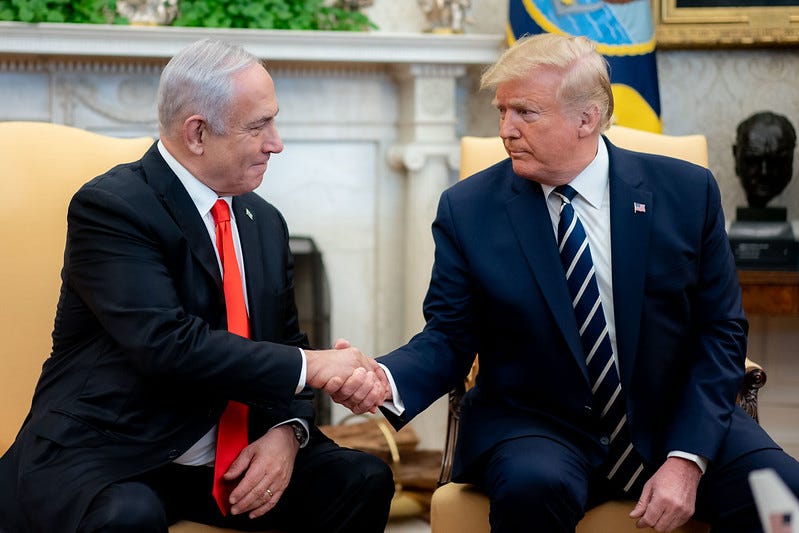The big news these days is Donald Trump’s 21 point plan to end the war in Gaza. The proposal includes a release of all the hostages at once (not in stages), an end to Hamas’ control of Gaza and more.
But there’s one thing missing: Hamas has not yet agreed to it.
We’ve seen this movie before and we know how it usually ends: with Hamas refusing, Israel returning to war, and the hostages remaining in brutal captivity. But this time just might be different.
Photo: Israeli Prime Minister Benjamin Netanyahu meets U.S. President Donald Trump in the White House (archive photo from 2020). via Flickr.
What makes this different?
This proposal includes a promise by Israel to not annex Judea and Samaria (the West Bank) and also to refrain from launching attacks within Qatar. That’s a big deal. Here’s why:
Israel frequently “talks up” plans to annex Judea and Samaria, only to later give up those plans in exchange for something else of value – for example as part of the Abraham Accord agreement with the United Arab Emirates in 2020.
Did Israeli Prime Minister Netanyahu ever actually intend to annex in 2020, or did he merely put the possibility “on the table” in order to create leverage for negotiations? All we know for certain is that Israel achieved something it wanted (an agreement with the UAE) without actually giving up anything concrete.
Israel’s attack on Hamas leadership in Qatar can be viewed in a similar way.
On the one hand, Israeli intelligence viewed the Qatar attack as a failure, because it did not achieve its goal of wiping out Hamas leadership. However, now that the possibility of attacking within Qatar is “on the table,” Israel can promise to refrain from such attacks in exchange for value.
So what’s the relevant value?
If Israel is making concessions to Qatar, this implies that Qatar may be giving something in return, perhaps withdrawing its support for Hamas, and for the first time applying true pressure on the terror organization. Perhaps. And maybe this could make all the difference. Maybe.
What’s in the deal?
There are plenty of news sources that break down the deal in depth, so we’ll address only a few high level points here:
-
The war will end immediately and all hostages will be released within 48 hours. As the hostages are Hamas’ only true remaining leverage over Israel, it seems unlikely the terror organization will agree to release them. However, the White House strategy seems to be to try and build the perfect combination of pressures: including from Qatar and other Gulf states, along with ongoing specter of continued IDF military action.
-
The deal references a pathway to a Palestinian state and a role for the Palestinian Authority, but only after certain benchmarks, which the Palestinian government is unlikely to achieve without changing its very national identity. This vision appears to be mostly aspirational, and does seem to pose a meaningful threat to Israel’s safety or reputation.
-
Palestinians will be permitted to leave Gaza voluntarily. A recent Gallup poll shows that most Palestinians in Gaza would choose to leave, given the opportunity, however it is still not clear which countries, if any, are willing to accept them.
-
There are references to aid, transitional governments (including Gulf states) and more, though most of these details are relatively vague and will probably be subject to further negotiations.
Is Israel being pressured into a deal it doesn’t want?
Some sources claim that Israel (or at least Netanyahu) is being pressured into this deal. However, non-public sources tell me that the White House often announces what are essentially Israeli proposals with a “made in America” stamp on them. This approach has the dual benefit of making the proposals more palatable to the Arab world, while also minimizing opposition from political factions within Israel.
Photo: Hamas fighters and their human shields. By Hamas media via IDF.
The only question that matters: will it work?
Over the excruciating two years since the October 7 massacre, Hamas has rejected at least nine different ceasefire proposals that I could identify. The pattern has always been devastatingly similar: an international party proposes a framework, Israel agrees to it, Hamas then “considers” the framework, before either rejecting it outright or else making a last minute change that undermines the whole deal.
Hamas’s intransigence stems from a misguided (but understandable) idea that the terror organization is actually “winning.” Encouragement from Iran and Qatar, recognition of Palestinian statehood, massive support at the United Nations and in the international press have all contributed to this tragic result.
Yet Hamas’ support base is mostly illusory:
-
the United Nations and European powers are big on talk, but typically provide little in the way of truly impactful support;
-
Hezbollah and Iran are severely degraded;
-
Bashar Assad’s Syria no longer exists; and
-
other than terrorizing Israelis in their daily lives, the Houthis are mostly ineffective on a strategic level.
This leaves only Qatar, which might be finally accepting the reality that Hamas is a losing bet, perhaps in exchange for Israel’s promise to no longer launch attacks on Qatari soil.
Even so, Hamas’ ideology might once again prove to be more powerful than any amount of rational thought.
This is a time for cautious optimism.





